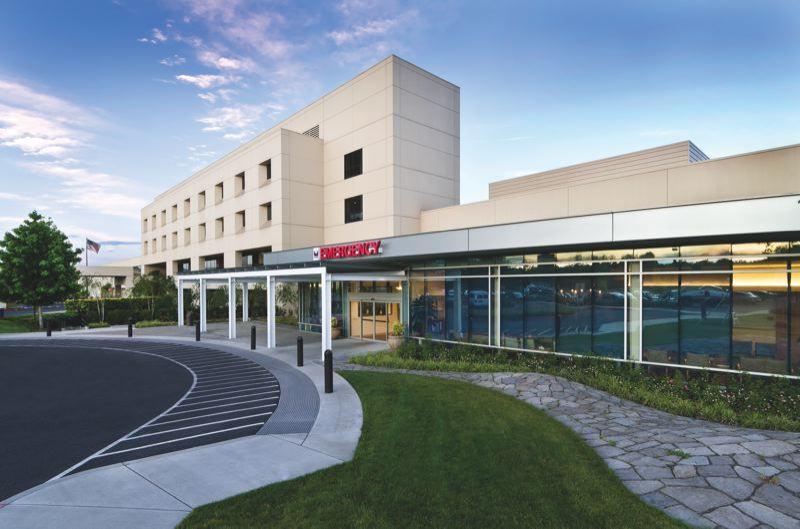
If it’s not measured, then it doesn’t matter.
So researchers at the Lown Institute — a health care policy think tank — wanted to compare data that didn’t just check whether a hospital was well-liked or well-funded, but how much the community around it benefited from its presence.
“The financial realities for hospitals are at odds with other things we might want hospitals to do,” study co-creator Shannon Brownlee said during the release of the Lown Institute Index for Social Responsibility. “The real goal is to start seeing hospitals in a different light.”
Oregon as a whole did well on the rankings of value, equity and outcomes. Out of 44 Oregon hospitals researchers considered, 33 received A grades.
At the top of the state’s list was Legacy Health’s Mt. Hood Medical Center in Gresham, ranked as the eighth most socially responsible hospital in the nation.
Lown researchers combined scores from 54 different metrics to make the determinations.
Dr. Vikas Saini, the Lown Institute president, said the rankings are not designed for consumers to decide where to schedule their next elective procedure, but rather for informed citizens to think about the public good hospitals ought to provide in exchange for the tax benefits and privileged status they receive in the community.
“We want them to think about these rankings more like: ‘What kind of health care system do we have, and is that the one I want for myself, my community and my country?’” Dr. Saini said. “I don’t think we want a system that has no soul, even if we live forever.”
Legacy Mt. Hood scored well in pay equity and showed success in treating patients from a wide range of income, racial and educational backgrounds, demonstrating cost efficiency and value. This sense of social responsibility did not extend to much investment in community health programs, however, nor to participating in requests for public information. Legacy spokeswoman Elizabeth Baker declined multiple requests for comment for this story, citing strain from the ongoing pandemic. The center has recently been in the news for a controversy among workers who are refusing the COVID-19 vaccine.
Legacy Mount Hood is a small cog in the big Legacy Health machine, dwarfed by the system's three big hospitals: Emanuel, Good Samaritan and Meridian Park.
With six primary-care hospitals and a children's hospital, Portland-based Legacy Health is a financially strong system reporting steady, if unspectacular, operating profits and a large and growing investment portfolio.
The system had a profit of $42 million from operations in the fiscal year ended March 31, down from $79 million the previous fiscal year, due in large measure to increased costs and lower revenues stemming from COVID-19. The system's operating revenue in the latest fiscal year was $2.27 billion, down from $2.3 billion the previous fiscal year.
The nonprofit's investment portfolio has surged along with the stock market. As of March 31, Legacy's investment portfolio totaled $1.3 billion, up from $1 billion 12 months earlier.
Legacy Mount Hood is a small contributor to Legacy's overall financial strength. For calendar year 2020, with revenue and cost impacts from COVID-19, it reported a profit of $2.2 million on operating revenues of $161 million. The previous year it had a profit of $15 million on operating revenues of $174 million.
Dr. Saini said the Internal Revenue Service could be providing more oversight of the “community benefit” hospitals are claiming in order to dodge taxes on their large properties, profitable investments and numerous transactions.
In line with other top names in U.S. health care, Oregon Health & Science University did not score highly in this new way of measuring success. OHSU received a B grade overall on the report. Its scores were bolstered by good clinical outcomes and a lack of unnecessary procedures, but dragged down by poor rates of inclusivity and income equity.
Riverbend Hospital in Eugene/Springfield also got a B grade overall, dragged down by a D on its poor ratio of executive compensation to worker wages and low investments in community health programs.
Kaiser hospitals were not included in the rankings this year because they are members of the Medicaid Advantage program, which had yet to release data.
The lowest-ranked hospital in the state was the Coquille Valley Hospital with a C. This very small, rural hospital in coastal Coos County demonstrated poor clinical outcomes. However, its patient satisfaction ratings were very high and it had good pay equity.
Dr. Saini said the scores are weighted but that low volumes and poor community health could reflect how many small, rural hospitals did not score well on the list.
“A hospital’s not going to wave a magic wand and fix all that,” he said.
Out of 3,010 hospitals in the rankings, only 75 earned A rankings across all three metrics — equity, value and outcomes — to earn a spot on the honor roll.
The Lown Institute will hold more events to dig into the data. See more and compare scores at LownInstituteIndex.org.
Christian Wihtol contributed to this report and can be reached at [email protected]
Shasta Kearns Moore is a freelance writer and author of MedicalMotherhood.com, a weekly newsletter for those raising disabled children.